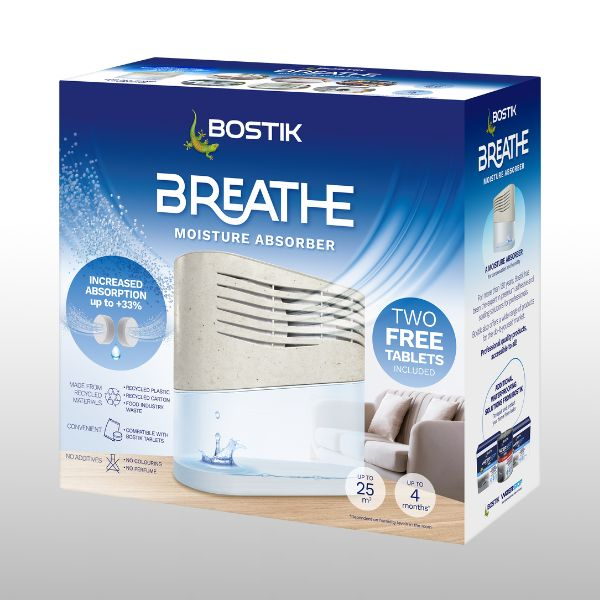Where to put a dehumidifier in the home
Is your home suffering from excess humidity? Excess moisture can work its way into and around your property causing havoc from room to room. In this article, we help you to understand the best place for a dehumidifier at home to control the common consequences of humidity you may be experiencing.
From condensation in a bedroom, black mould in a bathroom, or even musty smells in a wardrobe, our moisture absorber, Breathe, is compact and blends seamlessly into any interior. Locating the best dehumidifier placement in your home is easy and completely flexible for your needs.
So, if you find yourself considering 'where to put a dehumidifier in the home?', with Breathe, the short answer is anywhere!
Why use a dehumidifier?
Before we get into where to position a moisture absorber, it's important to remember why we need a dehumidifier in the first place.
A dehumidifier helps to reduce and control the moisture levels in the air to create the optimal environment for a happy, healthy family - no mould, condensation, or musty smells in sight. Discover all benefits to reducing humidity in the home in our 101 guide.
When it comes to choosing the best place to position a dehumidifier, browse our checklist of things to mindful of:
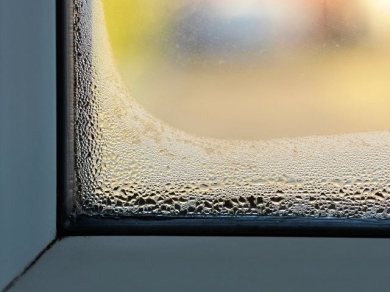
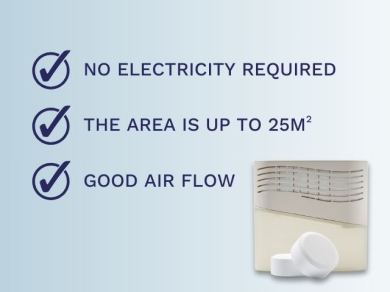
3 key checks for where to place a dehumidifier
1. Does it need electricity?
For electrical dehumidifiers, you'll be restricted to where you can place the system as it'll need to be positioned close to an electrical source. As Breathe is non-electric, you get the freedom to place it wherever you require.
2. Size of area
Knowing the size of your space will help you to determine if the dehumidifier will be able to successfully absorb the excess moisture in the area. Breathe can cover up to 25m2 using two tablets and 12.5m2 using a single tablet.
3. Air flow
It's important to consider a position in the room where it will be exposed to good air circulation - that is, ideally not in a corner or an alcove. This will ensure a consistent flow of air through the system so the tablets can absorb excess humidity, and the dehumidifier operates at its optimal level.
Now let's look at the best places for a moisture absorber, room-by-room.
Best dehumidifier placement by room:
Let's dive into the room-by-room analysis of some of the ways that excess moisture is caused in each room within the home.
Bathroom
Having a shower or bath is one of the largest contributing factors to excess humidity in your home. This is why bathrooms often have the title of 'most humid room in the house'.
When bathrooms aren't regularly ventilated using an extractor fan or by opening windows, the humidity stays trapped inside leading to moist and smelling towels, black mould, and condensation. However, closing the bathroom windows may be necessary if you're soon after leaving the home, for security reasons.
The solution:
- Use an extractor fan whilst showering and for 15-20 minutes after
- Open the windows whilst showering and for 15-20 minutes after
- Lower the temperature of the water
- Take a short bath or shower
- Use Breathe
Where to place Breathe? Place on a windowsill or cabinet and avoid being too close to the bath or shower
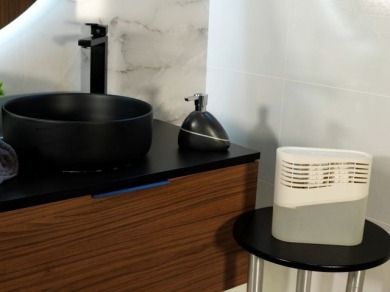
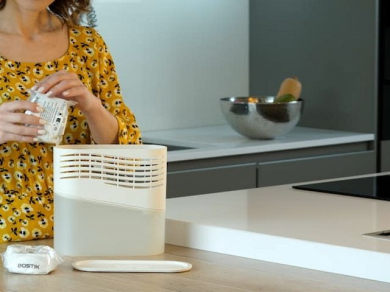
Kitchen
A lot of moisture in the kitchen can be produced whilst cooking - using the hob, oven and boiling a kettle. During cooler months, moisture from cooking can often stay trapped inside the room as windows are less likely to be open.
Problems occur such as mould and mildew, condensation on wall tiles, cabinets, and splashbacks, and even blistering paint and distorted cabinets, particularly around the hob and oven.
The solution:
- Use an extractor fan whilst cooking and for 15-20 minutes after
- Open the windows whilst cooking and for 15-20 minutes after
- Use Breathe
Where to place Breathe? A windowsill, side table or countertop, avoiding being too close to the kettle, hob, oven, and sink.
Living room
The kitchen often leads to the living room making it super easy for excess moisture to escape into this space. In cooler seasons, the high temperature difference and poor air ventilation causes moisture to be trapped behind furniture causing a whole host of issues.
Problems such as condensation on windows and ceilings, peeling wallpaper, blistering paint and even mould behind furniture!
The solution:
- Open windows for ventilation
- Close doors between the kitchen, particularly when cooking
- Avoid drying washing in the room
- Warm up the room
- Use Breathe - particular in colder months, you can keep your windows shut to keep your home warm, whilst Breathe works to remove the excess moisture
Where to place Breathe? Place on a windowsill, side table or even on a coffee table - Breathe's compact and neutral design ensures it effortlessly blends into all interior asethetics.
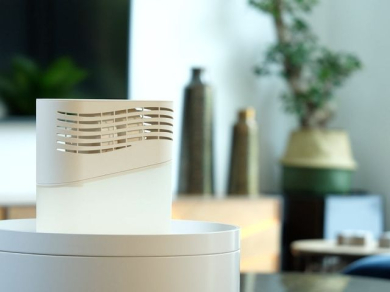
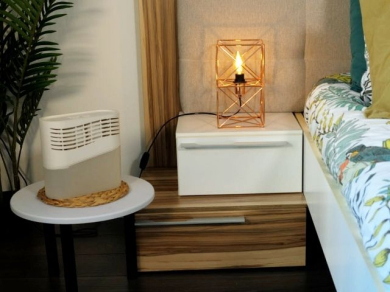
Bedroom
Water vapour is exhaled into the air when we breathe. As the bedroom is often the room people spend most time in, moisture from human activity can build up in this space. That's not forgetting the effect of changing temperatures and for those bedrooms with en-suites, humidity from the bathroom seeping into the area.
Unfortunately, it's not always practical to have the windows open all the time to control excess moisture and its unwanted effects which not only effect the property but can also trigger human health problems too!
The solution:
- Open windows for ventilation
- Close doors between the bathroom or en-suite, particularly during and after showering
- Warm up the room
- Use Breathe
Where to place Breathe? Position on a bedside table or windowsill. A single tablet may be sufficient for some bedrooms (coverage 12m2).
Wardrobes and cupboards
Clothes and damp, humid internal environments don’t go well together. Unfortunately, the excess moisture experienced in bedrooms and kitchens can cause clothes to smell musty within wardrobes and food or items stored in kitchen cupboards to be affected.
The solution:
- Opening cupboard doors and wardrobes regularly for ventilation
- Cleaning of cupboards to remove any problems from excess moisture
- Use Breathe
Where to place Breathe? Place within the cupboard or wardrobe where there is space or ideally, placing the unit central of the items can help to ensure there is a better air circulation for Breathe to be most effective.
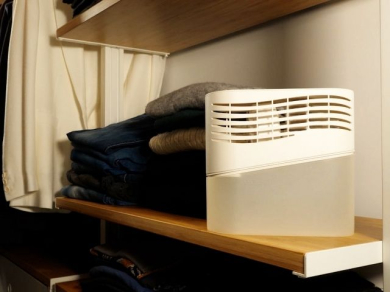

Garage
The garage is usually an area within a home where it's most difficult to control the humidity level. When outdoor humidity levels are higher than inside the house, excess moisture can occur creating musty smells, mould, and mildew. Similarly, cold, rainy periods can increase the garage's humidity as moisture from the ground can soak through the floor and walls.
Plus, vehicles that have been rained out create excess moisture when parked in the garage as the water dries and evaporates into the space.
The solution:
- Install air vents where possible
- Ensure tumble dryers placed in the garage feed through to the outside
- Use Breathe
Where to place Breathe? Place upon a shelf or on a worktop, ideally positioning the unit where there is better air circulation for Breathe to be most effective.
Caravans and motor homes
Caravans are notorious for condensation and damp. Unfortunately, as the British weather can be so unreliable and often cold and wet, caravans can easily be affected by these fluctuations in temperature. Paired with the lack of ventilation in the enclosed space, moisture builds up causing condensation. When left for a period of time, in between holidays, mould and mildew can grow, damaging the interior.
The solution:
- Ensure adequate ventilation to allow moisture to escape - throughout the space and in cupboards
- Keep the temperature regulated - heating the space in colder weather
- Open windows/doors when cooking and washing
- Avoid drying laundry inside when living away
- Wipe down surfaces regularly
- Ensure no water is left in the bath/shower and toilet
- Use Breathe
Where to place Breathe? Position on a table, worktop, or shelf, ideally where there is good air circulation. Ensure to empty the system of water and replace the tablets on a regular basis, especially when not in use, to maintain the interior and avoid moisture build-up.
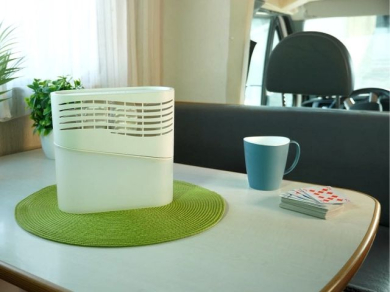
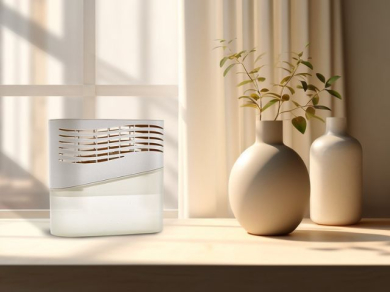
Conclusion
You now know the best place for a dehumidifier in the home and in your home from home. It's now up to you to fit that perfect position in your living space to help combat excess moisture easily and conveniently.
Breathe tablets last up to 4 months depending on the size of the space and humidity levels. Don't forget to empty and clean your system regularly and keep it refilled using the Breathe refill tablets.
Want to learn more? Discover our 101 guide to controlling moisture in the home or get the step-by-step for how to use dehumidifier, Breathe.

